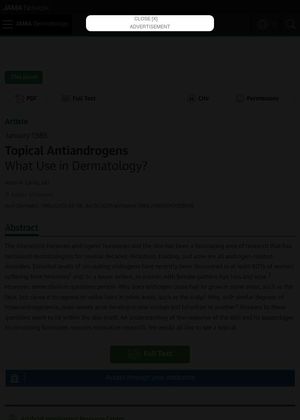TLDR Skin creams that block male hormones may help with hair growth, hair loss, and acne.
In 1985, dermatologists were intrigued by the interaction between androgenic hormones and the skin, particularly in relation to disorders such as hirsutism, balding, and acne. Elevated levels of circulating androgens were found in at least 80% of women suffering from hirsutism and, to a lesser extent, in women with female-pattern hair loss and acne. However, questions remained about why androgen causes hair to grow in some areas like the face, but leads to hair regression in others like the scalp. Similarly, it was unclear why severe acne develops in one woman with hyperandrogenemia, while another develops hirsutism. The answers were believed to lie within the skin itself, requiring innovative research.
15 citations
,
November 1983 in “British journal of dermatology/British journal of dermatology, Supplement” Testosterone increases hamster hair growth; cyproterone acetate reduces it.
 183 citations
,
March 1982 in “JAMA”
183 citations
,
March 1982 in “JAMA” Spironolactone is a safe and effective treatment for reducing excessive hair growth in women.
124 citations
,
September 1980 in “The Journal of clinical endocrinology and metabolism/Journal of clinical endocrinology & metabolism” Spironolactone is effective in treating excessive hair growth in women.
14 citations
,
April 1978 in “International Journal of Dermatology” Antiandrogens can treat acne, hirsutism, and seborrhea by reducing sebum production and androgen action.
 1 citations
,
September 2022 in “Journal of The American Academy of Dermatology”
1 citations
,
September 2022 in “Journal of The American Academy of Dermatology” Baricitinib helps grow eyebrows and eyelashes in severe alopecia areata patients.
 43 citations
,
August 2013 in “Pediatric Dermatology”
43 citations
,
August 2013 in “Pediatric Dermatology” Trichoscopy is good for diagnosing and monitoring hair and scalp problems in children but needs more research for certain conditions.
 2 citations
,
December 2004 in “Medicine”
2 citations
,
December 2004 in “Medicine” Different hair and scalp disorders cause hair loss or excess hair growth, with various treatments available depending on the specific condition.

The text is about acne, excessive hair growth, and hair loss due to hormones.
 11 citations
,
January 1985 in “Archives of Dermatology”
11 citations
,
January 1985 in “Archives of Dermatology” Topical antiandrogens might treat skin issues like hair growth, balding, and acne, but finding effective treatments without side effects is challenging.






